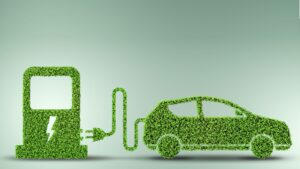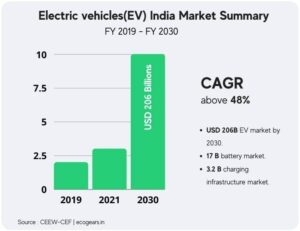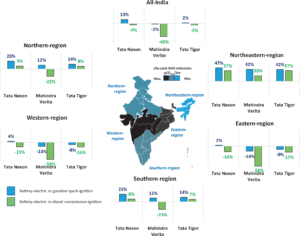Introduction of Electrifying India
The electric vehicle (EV) industry in India is experiencing a surge like never before, reshaping the country’s automotive landscape. As the world grapples with environmental concerns and the need to reduce carbon emissions, India has emerged as a key player in the global EV revolution. In this blog, we’ll explore the significant growth of the electric vehicle industry in India, examining the factors driving its expansion, key players, government initiatives, and the challenges that lie ahead.

The Electric Vehicle Landscape in India
- Rising Demand: One of the most prominent indicators of growth in the Indian EV industry is the increasing demand for electric vehicles. Consumers are becoming more environmentally conscious and are seeking cleaner, more sustainable modes of transportation. This shift in consumer mindset has led to a surge in EV sales.
- Government Initiatives: The Indian government has been proactive in promoting electric mobility. Initiatives like the Faster Adoption and Manufacturing of Hybrid and Electric Vehicles (FAME) scheme have provided incentives, subsidies, and charging infrastructure support to encourage EV adoption. Additionally, the government has set ambitious targets to make India a global EV manufacturing hub.
- Corporate Investments: Several major automobile manufacturers have entered the Indian EV market, either by introducing electric variants of their existing models or by launching dedicated EV brands. This influx of corporate investments is contributing to the growth of the industry.
- Infrastructure Development: The establishment of EV charging infrastructure is crucial for the widespread adoption of electric vehicles. Public and private entities are working to expand the charging network across cities and highways, alleviating range anxiety for potential EV buyers.
- Cost Reduction: As technology advances and economies of scale kick in, the cost of EVs and their components, such as batteries, has been steadily decreasing. This has made electric vehicles more affordable and accessible to a broader segment of the population.

Key Players in the Indian EV Market
- Tata Motors: Tata Motors has been a frontrunner in the Indian EV market with its electric car, the Tata Nexon EV. Known for its affordability and impressive range, the Nexon EV has gained popularity among consumers.
- Mahindra Electric: Mahindra Electric, a subsidiary of Mahindra & Mahindra, has been a pioneer in electric mobility in India. The Mahindra e2o and eVerito are some of their notable electric models.
- Hero Electric: Hero Electric specializes in electric scooters, offering a wide range of models suitable for urban commuting. They have a significant market share in the electric two-wheeler segment.
- Ola Electric: Ride-hailing giant Ola has ventured into the electric vehicle space with Ola Electric. Their electric scooters and plans for electric cars are anticipated to make a substantial impact on the market.
- Ather Energy: Ather Energy is known for its electric scooters, particularly the Ather 450X. With a focus on innovation and performance, Ather is carving a niche for itself in the premium electric two-wheeler segment.
Government Initiatives and Policies
- FAME Scheme: The Faster Adoption and Manufacturing of Hybrid and Electric Vehicles (FAME) scheme launched by the government provides incentives and subsidies to EV manufacturers and buyers. It aims to accelerate EV adoption and reduce carbon emissions.
- GST Reduction: The government has reduced the Goods and Services Tax (GST) on electric vehicles from 12% to 5%, making EVs more attractive and affordable.
- State-level Initiatives: Several Indian states have introduced their EV policies, offering additional incentives and support for manufacturers and consumers. States like Karnataka, Telangana, and Delhi have been particularly proactive in this regard.
Challenges and Future Outlook
While the growth of the EV industry in India is promising, it is not without its challenges:
- Charging Infrastructure: Developing a robust and widespread charging infrastructure remains a significant challenge. Building more charging stations, especially along highways, is essential to alleviate range anxiety.
- Battery Technology: Improving battery technology, increasing energy density, and reducing battery costs are critical for the long-term success of EVs.
- Consumer Awareness: Many consumers still have reservations about electric vehicles, including concerns about range, charging infrastructure, and maintenance costs. Raising awareness and dispelling myths are crucial.
- Competition: As more players enter the market, competition is intensifying. Established automakers and startups are vying for market share, which could lead to rapid advancements but also market saturation.

In conclusion, the electric vehicle industry in India is on an upward trajectory, driven by increasing demand, government support, and corporate investments. With a commitment to sustainability and a burgeoning market, India has the potential to become a global leader in electric mobility. However, addressing challenges such as charging infrastructure and consumer awareness will be pivotal in sustaining this growth and achieving a cleaner, greener future for Indian transportation.
